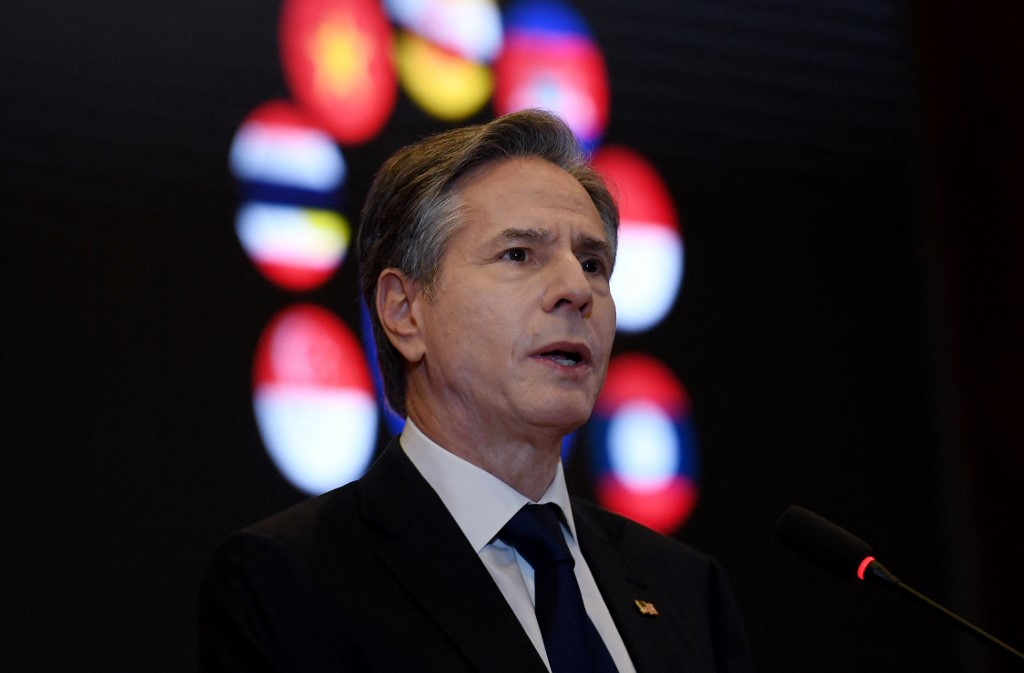RI asks US for ‘concrete’ Indo-Pacific cooperation
US promises to work with partners to defend rules-based order
Change text size
Gift Premium Articles
to Anyone

I
ndonesia has expressed hope for concrete Indo-Pacific cooperation with the United States, whose top diplomat was in Jakarta as part of a charm offensive in Southeast Asia, where China has a sustained presence.
After paying a courtesy call on President Joko “Jokowi” Widodo after touching down in Jakarta on Monday, US Secretary of State Antony Blinken met his Indonesian counterpart Retno LP Marsudi for their second bilateral meeting on Tuesday, emphasizing his country’s “strong commitment” to the strategic partnership with Indonesia.
The two sides agreed to establish a regular 2+2 senior officials dialogue on foreign affairs and defense and signed a new deal on education cooperation, as well as renewing existing deals on maritime cooperation and the US Peace Corps program in Indonesia.
However, the biggest expected gains remained elusive, as Jakarta sought assurances from Washington that it would deliver on a much-awaited comprehensive economic cooperation framework for the wider Indo-Pacific region.
Blinken also shifted the blame on the continued vacancy of the US ambassadorship to ASEAN – a demand of the bloc since former US president Donald Trump unseated the last envoy in 2016 – to the US Senate.
As Southeast Asia’s largest economy that is strategically situated in the crux of the Indian and Pacific oceans, Indonesia has been pushing to promote an open and inclusive regional order in the Indo-Pacific, unlike which Washington had been using to justify efforts to contain China in their overarching superpower rivalry.
With the 2019 adoption of the ASEAN Outlook on the Indo-Pacific, Jakarta has called for more cooperation on issues most salient to countries from the region, including maritime cooperation and connectivity.
After two years, Minister Retno said it was time for ASEAN to tackle priority issues with its external partners including the US, while stressing that mutually beneficial and concrete cooperation would contribute to the attainment of peace and stability in the Indo-Pacific.
“Indonesia hopes that the US will partner with us in implementing concrete cooperation within the ASEAN Outlook on the Indo-Pacific,” she said in a joint statement with Blinken after their meeting.
Working with allies, partners
Earlier that day, Blinken outlined in a policy speech at the University of Indonesia Washington’s Indo-Pacific strategy, pledging that the US will work with “allies and partners” to defend a rules-based order while playing down its own competition for regional influence with China. He amplified growing concerns about Beijing’s aggressive actions across the region, including in the South China Sea.
Blinken then acknowledged that the wider region had been left wanting for more economic partnerships with the US and said officials were developing a “comprehensive Indo-Pacific economic framework” that promises that US diplomats would identify new opportunities for cooperation.
The top US diplomat also promised “a better kind of infrastructure” cooperation through various partnerships with the likes of Australia and Japan, through the Quad partnership that also features India and with the Group of 7 advanced economies through its Build Back a Better World program, touting the risk of what would happen “when infrastructure isn’t done right”.
He made subtle swipes against China’s Belt and Road Initiative and its “opaque, corrupt processes” in awarding infrastructure projects, and how they are “built by overseas companies that import their own labor, extract resources, pollute the environment and drive communities into debt”.
China previously rejected these accusations, retorting that the US and other Western countries should start “earnestly implementing infrastructure plans instead of eagerly interfering in the internal affairs of other countries”.
Benefit of the doubt
Dino Patti Djalal, a former Indonesian ambassador to the US, said Blinken’s visit and his policy speech on Tuesday underlined that “America was back” in the Indo-Pacific and that it was looking to play an active role in regional cooperation, including on cyber, infrastructure, vaccines, as well as defense and strategic issues.
He said the US Indo-Pacific concept had so far been criticized as being a weak response to China’s far-reaching Belt and Road Initiative.
“We still want to know what the US wants [with its Indo-Pacific economic framework]. What is the mechanism? Is it government-to-government or something else? Who will be in it? But then this is the first rollout of the concept, and I’m open-minded and would like to see it elaborated,” he said on Tuesday.
Meanwhile, Synergy Policies founder Dinna Prapto Raharja said the US Indo-Pacific strategy was due for an update, especially since ASEAN and European countries had combined security and defense perspectives with maritime security and economic cooperation into their respective strategies.
She said if Washington insisted on putting more emphasis on tangible economic benefits to its partners, it would face difficulties in competing with China’s scheme, which allowed countries to formulate their profits with minimal conditions.
“The US must be clear about what it wants to give to friends and allies in Asia through the Indo-Pacific framework. It can't be abstract [...] because so far Blinken's rhetoric has given the impression that the US may decide to carry out protectionism if it doesn't get what it wants from friends and allies,” she told The Jakarta Post.
For its part, Indonesia has expressed its interest in a limited trade deal with the US after it retained its beneficiary status on the US Generalized System of Preferences last year. Minister Retno has also invited more US investments to the country, at a time when analysts say the US-Indonesia trade relationship has remained stagnant.









